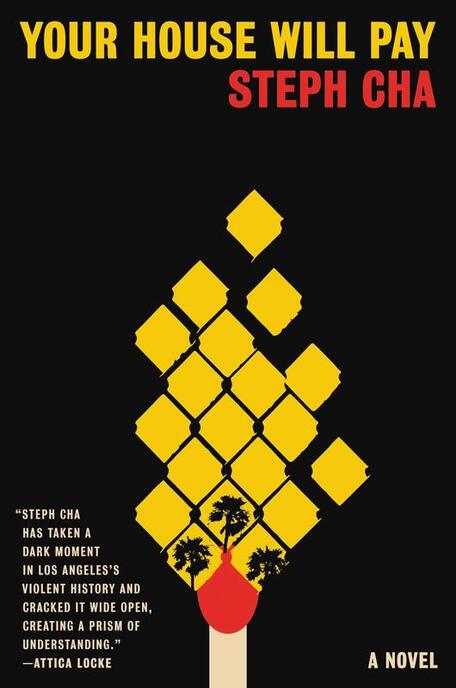READERS TELL ALL.
 Google estimates Steph Cha's age as 33. So, I kind of hate her. Just for her age, her ability to create so much, and do so much before she's even 35. She might even have Carson McCullers jealous, the author who published The Heart is a Lonely Hunter at 23, the queer author who was somehow able to enter the minds of so many very different characters and convince the reader. Recently, the #ownvoices movement has created a stir. John Boyne, a renowned author and personal favorite of mine, was criticized for writing about trans characters. I myself was told to only write about someone exactly like me. I am assuming there are only so many novels I can write about a fat white Southern gay man who is declared as terminally ill virtually every other week, give or take. The idea of writing only about ourselves is such a dangerous notion, as it ignores one of the most powerful and impactful gifts of writing: the ability to, if qualified, if putting forth a genuine effort, we can understand people who aren't ourselves. This involves reading books by others and listening to others and writing about others and letting these people who are these other people read and help you understand, yes, but if done and done well it's worth the effort. Reading Steph Cha, you might guess she has flown over all this effort and written a--if not perfect novel--perhaps the most important novel of our generation. You might compare her to Carson McCullers reincarnate, or you might call the literary Jesus but with better hair and apparel, but either way, she's a winner. Without effort, Your House Will Pay transports us to LA in the early 90s, just before riots which change so many lives, including some who haven't yet been born. We see black LA residents, young siblings positioned in a time some might look back with a strong sense of nostalgia, and while Cha has a rare gift of drawing you back with situations not soaked in blood or guns, there's something about your heart being twisted when you see how these kids, family, love one another, the whole time knowing things cannot stay great forever. Enter the Parks, Grace as the central figure who will find herself opposite Shawn Matthews, one of the children mentioned earlier in the book as a child of the early 90s. There have been deaths, there will be deaths, and yes, Cha has the capability of outmaneuvering anyone with decades more experience in crime fiction than herself--but Cha is here for everything. She wants you to feel the chills, your gut twisted with the unknowing, the need-to-know, the dying-to-know, the way she builds lives around you, the way she can break those lives with the flick of an ENTER key. What might make her the greatest young author living today, and possibly the greatest author of my entire generation--she has a gift that transcends writing in general, and moves into a much deeper, delicate, and resilient aspect of human nature: she uses words to cut through humanity and help us understand how we are all connected in the best and worst ways. This skill is not necessarily writerly, but more so only capable of a person with a great ability to practice both empathy and balance, two of many things comprising Cha's expertise. . Name an author who can do that. Name an author who can do that--an author who is 33, an author who, if my facebook stalking is correct, has been struggling with this novel for four to five years. There's a thunderous anxiety building through the novel, the fear of not knowing--not just in the case of whether rot someone will survive a crime, but more involved with the way we know people. I grew up in Hogeye, South Carolina with many less-than-great people, cousins I love despite the reminder, again and again, that if I ever "turn gay" (at the time, I didn't even know what the word truly meant) I would "burn in Hell." When my grandfather ran over a cat, not killing it but basically destroying it, my cousin--also not a great person--a born hunter, destroyer, used his Bowie knife to finally show the cat mercy. Later, his older sister sat in the McDonald's drive thru window crying about whether or not he would go to hell for killing the cat, gasping dramatically when she actually said the full word "hell," then whether she would go to hell for taking her friend's appointment at the tanning salon later in the day. In a more earnest way, the idea of killing, destruction, the loss of a life is something harder to reckon with. My family's struggles sound comical at parts, heinous at others, but that's important to note is that while no one is perfect, and certainly many actions are undoubtedly condemnable, the question is always there: can we lose someone we love so deeply if they have caused the loss of someone else's loved one? Can we hurt the people we love if they have hurt someone or something else? Can we take something so significant from someone we love so wholly when they have done to someone else? Even after learning someone does not love me in the way I love them, even in learning they might give me up even if I would never consider giving them up, I do not stop loving this person. I have not stopped in violence, in betrayal, in some losses greater and more permanent than death. Love is not something we can measure, walk away from, zip away from on a line or fly away like a superhero. People do not break off romantic relationships by simply turning and walking away like in CW television shows (and I love CW shows so much), but there is so much give and take, running back to one another, testing, doubting, hurting and being hurt, and sometimes things never really do end. The duality of everything being over and nothing ever being over, the dialectic between good and evil (if you suppose those are opposites), love and hate (if you believe those are opposites), but understanding that everything is ultimately a dialectic, a tightrope to be walked, the need to move forward no matter what and never pass judgment but always understand what is right and wrong, and not necessarily good or bad. These things are hard to differentiate, but Cha's book, a rare gem of a novel, does so beautifully, letting us understand how truly contradictory everything about love, family, race, class, and ultimately the types of civil war we wage against one another in all different parts of America on a day-to-day basis is something Cha does unflinchingly and spectacularly. This year has felt a lot like season one of Buffy, with Cha in the titular role fighting against the Master (please never question my Buffy knowledge, ever). Cha has come out on top, of course, releasing a novel that feels like V by Thomas Pynchon or The Secret History by Donna Tartt. While this is definitely not Cha's debut, Your House Will Pay stands out as Cha's first standalone, and a step forward as a new writer all together. She has evolved, somehow emerged in a way--not necessarily like a butterfly, as I will not accept anyone brushing Juniper Song aside in favor of this novel (even if this novel is one of the most genius books of any genres in years)--Cha is not here to fuck around. Her novel does what so few people can do: have an opinion. Or, rather, for Cha, she is offering you the option to have an opinion, rather than blindly follow a presidential candidate, a political party, a way of thinking, or, more clearly, who you have been shaped as compared to who you can be once you make your own decisions. In a world where words like "mansplaining" and "toxic masculinity" are thrown around like ultimate frisbee and then if one woman lies or alters any facts about a rape, all women are lying about rape, we need Cha now more than ever. Is it so impossible to believe that we may not know everyone completely? And why must this be so scary? While the crime community is guilty of using the fear of not knowing to churn out so many domestic thrillers, at the same time isn't not knowing someone completely part of the brilliance of knowing someone? If we treat each character like a book character, the flaming Scarlett O'Hara who only wants love when it doesn't want her, Rhett Butler who must be yearned for despite being a racist and a rapist--what if everyone was this simple? I would stay home. Unlike other writers working with issues of social justice, Cha takes a step down and does not defend Korean Americans, and still she doesn't take the Black Americans who costar in her novel and make them all martyrs--in fact, she writes of doing the opposite in Your House Will Pay. People are humans--truly, utterly human--and Cha has imagined them, walked through their shoes, listened to the music they like and pushed herself through every scenario of their past and present lives. Cha presents characters who cannot make one decision or take one action and assume things will only progress and change in a straight line. For Cha, there are a dozen people who act for a hundred reasons and when you combine all of these things, there is no order, there is no absolute truth, and there are no perfect and definite decisions. The broken love Cha presents doesn't mean love no longer exists. It's just real. And it's scary. We can love one another but not like, appreciate, or endure anything the other person does. Love doesn't have a switch, and the wretchedness of the emotion, the good and the bad, the beauty even in the wreck, I think that's the most difficult part of living with people, and Cha presents this so well. Oh, and there are guns, deception, fear, death, and a walkman or two. And your heart will break. But in Your House Will Pay, Cha presents a world where everything may not be perfect, and hope may not be the thing Christian movies about soldiers and dogs offer, but there is peace in accepting we are complicated people with complicated pasts, and sometimes even if the daily struggle of understanding the balance of everything in our life is too much, it's necessary. You loved Juniper Song? Steph Cha was just getting warmed up.
0 Comments
Leave a Reply. |
AuthorWrite something about yourself. No need to be fancy, just an overview. Archives
December 2022
Categories |

 RSS Feed
RSS Feed
